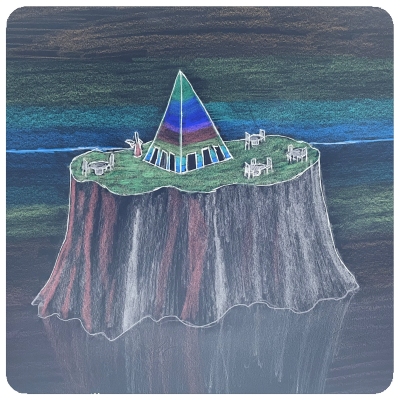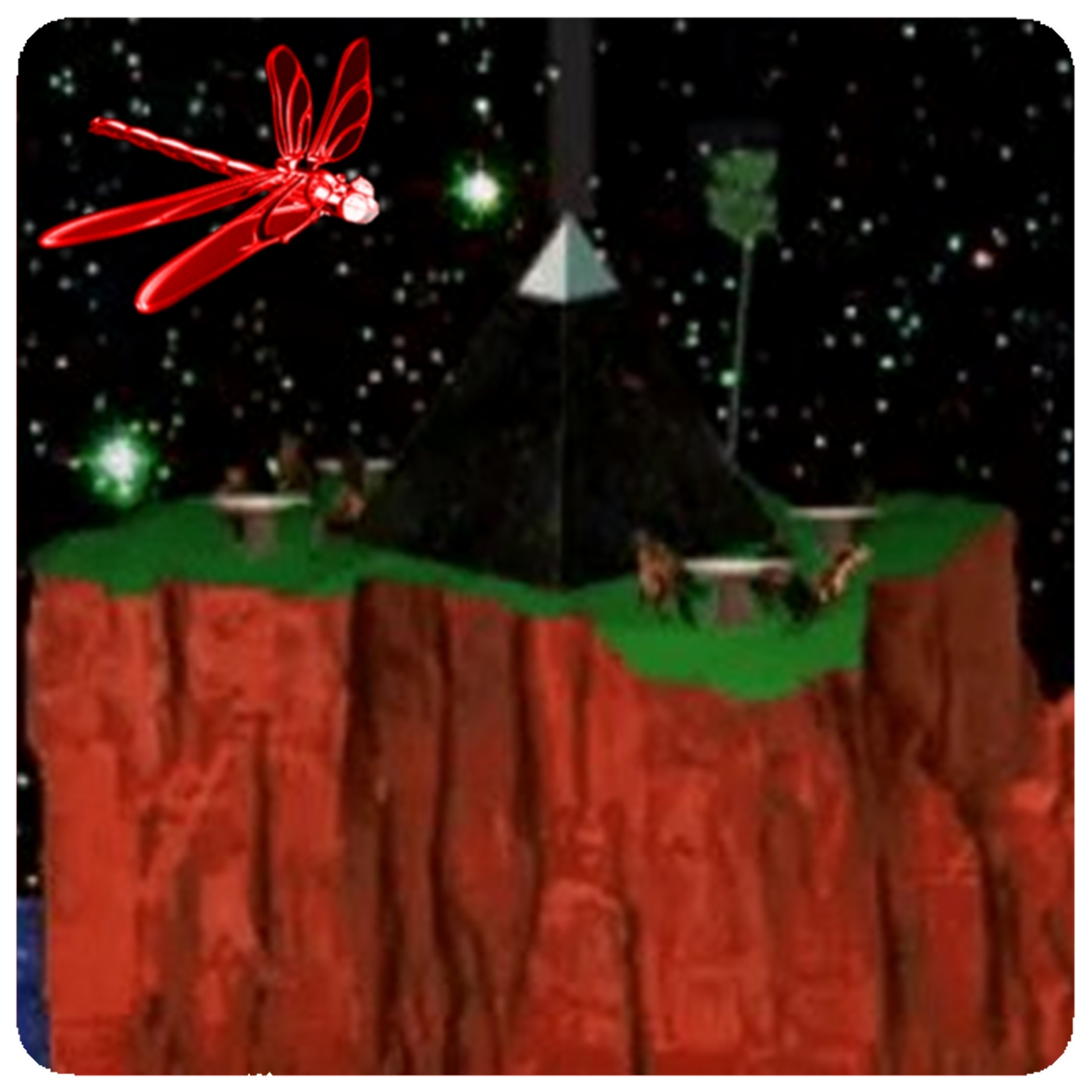
MVC Podcast 8: When Universes Collide
& The Red Birds
[00:56:44] January 31st, 2023
Charles Reuben loses his parents, and Blythe gets imprisoned.
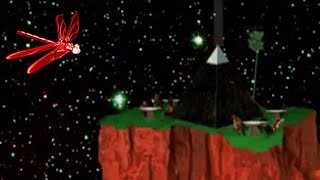
or

or listen through
or the RSS feed.
It was nice to take a break from New Delhi. We were kind of stuck in New Delhi for about five months waiting for the government to tell us when to come in for various meetings. They finally told us, “That was the last meeting!” and all that’s left for us is to wait until they tell us it’s time for to come in and pick up my OCI, which is basically like an Indian Passport for semi-citizens, people like me who are married to an Indian Citizen, or the same thing is also given to Indian citizens who relocate to other countries and become citizens of those countries. They can no longer be considered full-fledged Indian Citizens, so they become “Overseas Citizens of India,” which is what OCI stands for.
But what does any of this have to do with “The Multiverse Cartographer” you ask? “Everything!” I retort. For one thing, this is the stage that I am at in my own real-life interdimensional odyssey, except it all takes place in one dimension, I assume.
On another level, books are in a way like time capsules. Aldous Huxley, later in life, would often become annoyed that “Brave New World” was the thing he was best known for, since “Brave New World” was the product of his younger self who’d never even tried mescaline, not even once! He would suggest that people should skip “Brave New World” and instead read the book he was most proud of, “Island.” I’ll give you a minute to write that down, or to pause this video and order a copy on Amazon. Okay, not a full minute.
“The Multiverse Cartographer” is a bit of an odd bird. Instead of one time-capsule, it is many time capsules, a time-capsule sandwich, if you will. It is a portrait of the mind of a 20-year-old Edward, living at Gordon’s, getting inspired to revamp an old story that an 18-year-old Edward had conceived of at a coffee shop, Conrad’s on Lake Avenue and Walnut Street to be specific.
Then, a 24-year-old Edward revisited it, writing new chapters on his blog on one of the computers available to Swork patrons, at the intersection of Colorado and Eagle Rock Boulevards. Then, a 27-year-old Edward added another layer while working at Screen Actors Guild, during his breaks, of course, obviously, since 27-year-old Edward would never work on a person project on company time, that would be stealing. It was my Drone phase. Like Blythe, I served 10 years under the manager-gods. Some of them were nice. Hi, Stacie! Hi, Dinah! Cassandra... well…
Anyway, later, a 36-year-old Edward who’d quit his job to become a Yoga instructor, but drove Uber to make ends meet, started a podcast spin-off of the same story, The Interdimensional Coffeehouse, and then that same Edward, who is now 44, has added a distant-future textbook layer of voice to the whole thing, edited it a bit here and there, pruning it like a bonsai tree, tied one or two things together, wrote a little to fill in a few gaps, while still leaving plenty of gaps open for the imagination to stumble over and say, “Hey! There’s a gap here! What happened next?” It’s been a minute since I gave ol’ Mrs Brunke a shout-out. Hi! I hope you’re enjoying this! It’s all for you, Mrs. Brunke!
So, all of that being said, next up on the agenda for today are two chapters. Last time we read, “The Coffeehouse” and “The Subways.” Today, we’ll read, “When Universes Collide,” and “The Red Birds.” “When Universes Collide” picks up right where “The Coffeehouse” left off, and “The Red Birds” picks up basically where “The Subways” left off, but there’s a two-year time-jump in Blythe’s story there. The Red Birds themselves you should already be familiar with, if you saw the video called, “Jobe” or, indeed, if you read the chapter of the same name in “Smaller Mouse.”
Oh, by the way, if this is the first one of these you’re seeing you may or may not wish to start at the beginning of this series and work your way up to this one. This is the 8th video in the series called “The Multiverse Cartographer.”
Now, without further ado, I will begin reading the chapter called: WHEN UNIVERSES COLLIDE
One of the more controversial, somewhat apocryphal, accounts of the early life of The Multiverse Cartographer is an answer to the question, “What ever happened to his parents, Dan and Jean?”
There is a secondhand account of a conversation which a certain Ben McDevitt had with Charles Reuben’s close friend and confidant, Isaac, which should be taken with a generous helping of salt.
It has been passed down to us as follows:
When Charles Reuben started kindergarten, he tried to tell his teacher, and the other children, about The Coffeehouse, but his teacher accused him of lying and making up stories.
Eventually, he gave up trying to tell people about it. His parents told him that they wouldn’t understand, that it was too far out for them, and that people aren’t ready.
He used to draw pictures of what he remembered.
Then, when he was about seven years old, his parents told him that they had to take care of something very important. They’d called the babysitter from down the street, who Charles knew.
They told him they thought he was old enough to understand. They drew charts, and used the example of folding a piece of paper, and having him visualize a ball moving through a two-dimensional plane to conceive of higher dimensions.
They explained that sometimes fifth-dimensional universes, complete with a near infinite number of fourth-dimensional timelines each with a beginning and end, crash into each other. When that happens, sometimes one, two, or three new universes are produced.
They explained that 14 some-odd billion years ago that had happened. Two other universes had collided and produced their own universe, in all of its forms, along with all of its cousins with their various timelines.
They explained that they were on a collision course with another universe, that they had to act very quickly in order to prevent an imminent collision which would destroy their universe in the past, present, and future.
Using The Coffeehouse, they had backed into the sixth-dimensional space in which these fifth-dimensional universes were about to crash, and they were able to see when it would happen.
They hypothesized that by getting into the seventh dimension, they would be able to their alter course. His mother had to stay in that other universe, temporarily, while his father withdrew into seventh-dimensional space. Charles Reuben would have to remain there, in their home universe, in order to allow all of them to continue existing.
They told him that there were two possible outcomes: One was they would leave, and come back a few minutes later, and everything would be fine. The other was they would all three cease to exist entirely.
This was very heavy for young Charles Reuben to absorb, but he trusted his parents. With tears in his eyes, he wished them luck, and said he would wait for them.
So, they opened the door to The Coffeehouse.
The babysitter was in the living room, Charles Reuben was in the den. He watched them walk through, and the door disappeared behind them.
He sat on the floor. As he looked over his left shoulder, to his surprise the writing desk and the dresser were gone. They had been replaced with a bed, and a table with a television.
The window was still there, and the view outside was the same, but nothing else was familiar.
Then, a young girl ran in and asked him who he was, and what he was doing there.
She was followed by an adult, presumably her father, who was very upset and yelled at Charles Reuben.
The man opened the door and told him to leave.
Charles Reuben waited on the sidewalk, rocking back and forth crying until the police arrived.
From September of 1932 until February of 1933, a science fiction serial called “When Worlds Collide” debuted in Blue Book magazine. Two planets are on their way into the solar system. The first will destroy the Earth, the second will take its place, and is habitable, a place for the survivors of Earth’s destruction by the first planet. In the story, they had nuclear powered rocket-ships, though nuclear technology was about 10 years away from becoming a reality at the time that it was written.
That story has one or two parallels with this chapter called “When Universes Collide,” and aspects of “The Interdimensional Coffeehouse” in general. However, since before yesterday I was only familiar with the 1999 Powerman 5000 song with that title, these similarities are surely coincidental. Right, that one.
That being said, it is said that that 1933 story forever influenced science fiction from that point forward, so maybe there is a subconscious connection after all, a sort of collective-subconscious thing. Maybe.
In reality, though, I divided the first episode of the original “Interdimensional Coffeehouse” podcast into three parts as I was putting together “The Multiverse Cartographer” book in 2022, and this second part of the three parts I, at that time, gave the title “When Universes Collide” since that’s kind of what the chapter is about. That’s enough about the title.
You might have noticed that the top layer voice of the book is back again, that textbook narrator from the distant future, explaining that we should take all of this with a grain of salt as it is “somewhat apocryphal” and such. As I mentioned, this textbook from the future voice was written in 2022, while the rest of the chapter was from 2015.
There’s more autobiographical allegory in this bit, with Charles Reuben trying to share his other-worldly experiences with the other children and getting accused of making things up. One time in particular I recall being seven-years-old at a party, and for some reason I thought it would be a good idea to help my friend Michael to establish a “Space” which is like a “Temple in Malkuth” for any Golden Dawn folks watching, but the “Space” came from Erhard Seminars Training, which is basically The Landmark Forum before you were allowed to go to the bathroom. That’s funny, by the way, for those who didn’t know. You should be laughing.
Anyway, it turned out that my friend Andy, who wasn’t really a friend at the time, but now he is, he’s an Episcopal Rector and we follow each other on Instagram and occasionally click like on each other’s posts, but anyway when Michael and I were 7 and Andy was probably 9, Michael had his eyes closed and I was giving him instructions to create a room no one else can enter, with a big comfortable chair, and a screen that’ll show him anything he chooses, and all of a sudden Andy jumped out from behind something, laughing and saying, “I can’t believe you actually believe in all this stuff!”
My parents had warned me not to share certain things with “Normals.” My dad told me that it might seem like a good idea to share one or two of these kinds of things, but that it would usually “backfire.” I wasn’t really sure what that meant, even in terms of literal shooting, but I adhered to the rule of secrecy very strictly up until this day with Michael. After Andy jumped out and started saying all that, I figured this must be the “backfiring” my dad had talked about, and I covered it all up in a very seven-year-old-smooth kind of way, claiming that I knew Andy was there the whole time, and I was doing it all just to mess with his head.
My parents also told me that the “Normals” wouldn’t understand things like tarot and meditation and all, that it was too far out for them, and that people weren’t ready. “Normals” were defined, by the way, as everyone in the family except for them, and everyone else in the world, except for a few people who they’d tell me it was okay to talk about things in front of. You can imagine what this might do to the developing mind of a four or five year old, or six, seven, or eight year old, or twelve year old. I don’t have to imagine, I was there, but from up close some things are harder to see.
Time can serve as a kind of distance and, looking back, I can say that yeah, it definitely had an effect. I couldn’t, and still can’t, even pretend to be what they termed “Normal,” whatever that is. Music trends, including the rejecting of trends, sports fandom, kung fu movies, or having a favourite director or genre, career aspirations, or anything else. At a certain point, of course, nature takes over and I could relate with other boys on the topic of which girls we found attractive, and eventually, as an adult, I came around the long way, the very long way, to learning to appreciate some of these “Normal” things, albeit as if I were an alien learning to be human, or a time traveller exploring the early 21st century from a socio-anthropological point of view.
I find I fit in a great deal more in India than I did in California. Here I am quite simply a foreigner, to the gaze of the local strangers. In California I looked like I belonged there, in that I looked like I didn’t belong there, another descendant of the ones who stole the land. “Which kind of late gen-ex white guy are you?” one might unconsciously ask themselves, or me, and I would have nothing so say, really, other than, “I’m sorry, my parents told me not to talk to Normals.” It sounds like a cult, doesn’t it? But what happens when the only other members of your cult are dead, and you’re the only one left? Well, I don’t know what you would do. Me, I joined a cult! Seemed to make more sense than anything else, at least for 18 and a half years or so. After that, I moved to India. I still haven’t found a satisfactory answer, but I’ve managed to find someone who doesn’t fit in her world just as much as I don’t fit in mine, so we enjoy making our own world together that nobody really understands.
Anyway, next we have the dilemma of the universes about to collide into each other. Since higher dimensions fall under the heading of theoretical physics, and any rules, laws, or definitions there may be may vary from one fictional universe to another, rather than saying this is based in like reality-reality I’ll preface this by saying that this is how higher dimensions work in The Interdimensional Coffeehouse universe. Do note, though, that when I say “The Interdimensional Coffeehouse universe” the word universe, in this usage, refers to the reality-space inside of the fiction called “The Interdimensional Coffeehouse,” which includes a universe just like yours, as well as Blythe’s universe called “The New World Empire universe” as well as the home universe of The Creepy Man, which we’ll get into later. Seeing as these are words on an, in a sense, two-dimensional piece of paper it should come as no surprise that there aren’t more than these four four-dimensional universes, if you count the Coffeehouse itself as the fourth, included in the over-all story.
What do I mean by four-dimensional universes? Good question! It leads nicely into this next part which is really convenient, so thank you. Jean and Dan Reuben go over it quickly, but no doubt they took a bit longer than our distant future Multiverse Cartographer textbook’s synopsis of Charles Reuben’s recollection of it, so I’ll go over it nice and slow. Even slower than you likely need me to go, just in case there are one or two people watching this who aren’t even really familiar with the three conventional dimensions. Who knows? It could happen.
The first dimension is a line. The second dimension is a plane, as if the line moved from side to side. Almost like a piece of paper, except a piece of paper can bend, and fold, and if you look very closely you can see that a piece of paper isn’t completely flat. A two-dimensional plane is completely flat. Moving on. If a two dimensional plane were to move up and down, sort of perpendicular to itself, it would create a space. You can think of it as a cube, or a sphere, but strictly speaking it goes on forever. X, Y, and Z, height, width, and depth.
To help explain what comes next, we’ll begin using these first three dimensions as metaphors to help conceptualize the higher ones. If all you ever knew in your life was height and width, and you’d never heard of depth, what would a sphere be like to you? If it were to move though the plane of your reality, your flat piece of paper universe, it would first appear as a very small circle, when the sphere first made contact. Something from nothing. Then, the circle would grow. The circle’s growth would slow down as the plane reached its equator, let’s say, then it would begin shrinking in a similar way that it grew. Eventually, it would be back to that very small circle and then it would disappear, back to non-existence. Truly, it would be like magic, to your two-dimensional eyes.
So, what is it that has a beginning, middle, and end in our three-dimensional universe. That’s right! Everything! This is why the fourth dimension is often referred to as “Time.” If we were to look into a mirror, in the fourth dimension, we would see the whole sphere, you might say, rather than the single circle that we are today, in this moment. We would see a baby, a toddler, a child, a teenager, a young adult, middle aged, silver-haired, elderly, and finally a corpse version of ourselves, all at once. So, a four-dimensional universe is a universe with a single timeline, starting with a big bang, ending probably with a big freeze, hyper-massive blackholes and dead planets separated by vast distances and, eventually, the very fabric of sub-atomic particles unravelling into oblivion. And what happens after that? Well, you’ll have to wait and see! Or, just step up into the fifth dimension and look into a mirror.
Now, if you were to go back in time and give yourself a winning lottery ticket, you would of course be creating another timeline, an alternate universe. This would be a branching off of that previous four-dimensional universe, literally like a kind of tree existing in the fifth dimension. In fifth-dimensional space, you would be able to move from one timeline to another. In fiction like Rick & Morty, and most of Interdimensional and Multiverse fiction, this is the level they’re operating on. Sometimes they might allude to even higher dimensions with greater variance, other universe types. I’ll get to that momentarily.
When the Reubens are talking about a fifth-dimensional universe crashing into another fifth-dimensional universe, they’re referring to two different universes of the same type, each of which contains an almost infinite number of possible timelines. If two fifth-dimensional universes were to be separate from one another, it would be taking place in the sixth dimension.
In The Interdimensional Coffeehouse universe, it is taken for granted that a collision between two such universes took place, or takes place at some point, resulting in the fifth-dimensional universe that Charles Reuben is from.
If we stop and think about it, we’ll surely realize that the fifth-dimensional universe that Charles Reuben is from is the same fifth-dimensional universe that Blythe is from. Henry the VIII either had a healthy son, or he didn’t. Legally speaking, I mean. Catherine of Aragon may have had an affair with one man instead of another, or it may have come down to which sperm won the race that day. Either way, Charles Reuben and Blythe’s universes were one, prior to that moment of conception. After 1511, the two universes began to diverge.
So, one can assume, if Charles Reuben’s fifth-dimensional universe, in other words if that five-dimensional tree of four-dimensional timelines which contains Charles Reuben in one of its branches, was about to crash into another different fifth-dimensional universe-tree of the same universe-type, that the universe which Charles was in, which was about to be destroyed, also contained Blythe and The New World Empire in another of its branches. From that perspective, Charles Reuben didn’t travel very far when he slid down Maxwell Montes on Venus, and it would make sense to say that her universe was a very close cousin of his own.
So, then, if the sixth-dimension is that space in which a nearly infinite number of individual fifth-dimensional universe-trees each containing a nearly-infinite number of possible four-dimensional time-line-branches of universes of the same type, then what about the other types? That’s where we would get into the seventh dimension.
In the seventh dimension, it would be easier to visualize these sixth-dimensional spaces of universe-types as if they were flat two-dimensional rectangles floating in a kind of three-dimensional space. Or, if you’d like, an infinite space in which you occasionally find, here and there, infinite two-dimensional planes with vast empty spaces between them. In this metaphor, the three dimensional space we are visualizing represents the seventh dimension, and the occasional two dimensional planes represent sixth-dimensional universe-types. I prefer to think of it as rectangles floating, personally, so we’ll just go with that for now.
Since our minds are programmed to think in four dimensions, this would be an appropriate metaphor, the flat rectangles floating here and there in empty space. Reason being, from a scientific perspective, the initial conditions for the various universe types being other than what they are for our universe type will, most often, result in no manifestation whatsoever, or one that is very brief. For example, if gravity was substantially stronger, or even slightly stronger, or weaker, than it is. If the speed of light, or the universal speed-limit, was slightly faster or slower than it is. Or, any other variation. This is just talking about universe-types that we can almost kind of wrap our puny human minds around, and then of course there are all the others.
So, the empty space between the rectangles is the space where nothing happens. Then, occasionally, as in the case of the initial conditions of our universe type, there is a rectangle floating, a universe-type that works. Every once in a great while, very rarely, other conditions will line up in a way which can manifest something, and that would be one of the other rectangles floating in the void.
From this vantage point, it would seem that nothing whatsoever is the natural state of things, whereas things happening is something of an anomaly, like when you go to sleep on a hot day and forget to wash your dishes, then wake up the next morning and there are ants everywhere. If there were a desire on that level, it sure makes one wonder whether it would desire existence of something or non-existence. A silly idea, of course, as it would depend on the preference of the being doing the desiring.
Anyway, that should be enough to give you a little more to go on with what’s happening in this part of the story, and what it means that Dan Reuben has to “back up into” the seventh-dimension, while Jean moves into the other fifth-dimensional universe, the one that isn’t ours, nor theirs, nor Blythe’s, but a completely separate tree with its own big bang that went differently, and all of its own 4D branches of possible outcomes.
Charles Reuben would be the third of the trio. Perhaps it is with Dan’s intimate familial connection to his wife and son that he, once in 7D space, would be able to rearrange things in our particular 6D rectangle, as he would be able to locate Charles in one 5D tree and Jean in another and adjust their trajectories before the collision. See, it actually does make sense, even though it sounds like I just made up a bunch of science fiction sounding things and threw them all together in lieu of saying “Charles Reuben’s parents died.”
Anyway, something apparently went wrong, and something apparently went right. Dan and Jean used the Coffeehouse to prevent the collision which would have caused the Coffeehouse to cease to exist in its own past present and future. But, since it exists in Jobe’s rectangle outside of time and space, a gift from the gods as it were, is it even possible that something as circumstantial as a multi-dimensional cataclysm in the sixth dimension could erase it from existence? Maybe, maybe not.
They had succeeded, but now they were no more. Charles Reuben, though, still existed. Could this be because The Interdimensional Coffeehouse anchored in 2D space but with access and causation even beyond 7D space, and rooted in the 4D space of The New World Empire universe in 2656 needed Charles Reuben to grow up and begin exploring, to meet Arthur and Joseph Fathom, to provide the strange story which inspires Charles the Grey’s parents to give him his name, to help Blythe and Charles the Grey rescue Simon in a particular way which results in the exponential multiplication of the original Coffeehouse island and creation of the Claras and, later, Larry the Librarian? You decide! Probably, yeah, that’s probably what it is.
Did the universes collide but somehow actually combine like two drops of water becoming one? Maybe! These might be good topics to explore in a prequel or a spin-off type of thing should there be enough demand at some point closer to the corpse part of this four-dimensional universe-branch than it seems to be at the present so-called “moment” in our mutual three-dimensional perception. Perhaps a comic book series…
Anyway, the part where Dan’s den ceases to be Dan’s den and is now a little girl’s bedroom, I must admit, was probably influenced by that part in Back to the Future 2 when Marty sneaks into his bedroom window only to discover that it’s someone else’s bedroom, waking up a teenage girl whose dad then comes in with a baseball bat, and all that. It’s a similar kind of situation, on a surface level.
The chapter ends with Charles Reuben waiting on the sidewalk, rocking back and forth crying until the police arrive. These are symptoms of what is called an anxiety attack. I’m only kidding. I mean, not really, but yeah. Charles Reuben lost his parents that day.
This is another example of Charles Reuben being an exaggeration of myself. I wasn’t seven, though, I was 15 when I lost my dad, and 19 when I lost my mom. They didn’t die saving the universe from annihilation, but I thought it would be nice to remember them that way. After Dan and Jean disappeared, Charles Reuben became the only person in his universe, or at least his 4D branch of it, with any knowledge of The Interdimensional Coffeehouse. Similarly, while there are plenty of people in the world subscribing in various ways to UFOs, astral projection, mental telepathy, ESP, clairvoyance, spirit photography, telekinetic movement, full trance mediums, the Loch Ness monster, and the theory of Atlantis, thank you Ghostbusters, there weren’t any who had the particular take on it all that my parents did, and that they left me with.
Looking back, when I was 24 years old and wrote the scene in the previous chapter where Blythe’s mom dies, I was kind of going for an emotional gut-punch. I even remember crying while I was writing it, back then. Blythe’s mother was murdered in front of her, presumably so was her father on the day that Blythe was born. She would now be like Batman or Horus the Avenger, dedicated to seeking out Set and taking revenge, in this case seeking out the Red Birds, or The New World Empire in general. In this sense, you could fairly say that Joanne Elbakyan got “fridged” in chapter seven, and I wouldn’t disagree. In my defence, though, back then I didn’t know the meaning of the word “trope.”
Later, when I was 36, I wrote this chapter, or this episode one of The Interdimensional Coffeehouse podcast. In this case, Charles Reuben loses his parents in a different kind of way. Nobody killed them. There’s no one to blame. It wouldn’t even really make sense to blame interdimensional travel itself, or The Coffeehouse, since they died, or ceased to have ever existed, in the process of saving the universe, in a way sacrificing themselves for the greater good. I really wasn’t going for any kind of emotional gut-punch this time around, nor was I experiencing one while I was writing it. Perhaps this is the difference between the experience of having lost one’s parents 5 years prior versus more like 20 years. In other words, at 36, I would have had to really work at feeling any pain or sadness about the loss of my parents, where at 24 it was still very much with me. Today, I am 44.
I’m bringing this up because my good friend Robby was telling me recently about how haunting and sad this aspect of Charles Reuben was, the loss of his parents, and how powerful it was to weave my own pain and sadness into the story. It took me by surprise because from where I’m sitting I hadn’t intended any such weavings. Actually, for me today, being alone in the world save for my sister, technically half-sister, my wife Priyal, and the friends I’ve chosen to remain connected with, seems to be very much the norm. It seems to me that I was removing Charles Reuben’s parents from his life simply to establish that he too, like me, is alone in the world, and self-determined. His actions are neither to please his parents nor to rebel against them, as they simply do not exist. For me, existing in this same state enabled me to up and leave California and settle in India without checking with anyone first, or needing to convince anyone. For Charles Reuben, it enabled him to become The Multiverse Cartographer.
Enough about all that. Shifting gears a bit, I’ll continue reading one more chapter in which we’ll check in with Blythe in The New World Empire universe two years after the previous chapter, in which she tragically lost her mom. This next chapter is called: THE RED BIRDS
Simon’s right pupil directed the small lens. He moved from camera to camera about the neighborhood above.
The Red Birds showed no sign of concentration in any specific area, but Simon had a feeling they were planning something.
“I want thee to stay here if anything happens, Blythe. We will need someone here watching to tell us where they be.”
“My nine-year-old brother could do that for thee,” Blythe retorted without lifting her eyes from her Sun Tzu. “Or perhaps thou might hast one of the Drones doth it for thee, I doubt anyone would notice. The manager-gods are a little slow these days, I hear. That way I can be out there saving thine ass from the Red Birds the next time thou slippest on shit.”
“Wilt thee let not me live that down? That happened once! I have saved thine ass more times than I can count. I am afraid, one of these days, thou’lt be spacing out and contemplating the meaning of a hamburger, and I will not be there to parry the blade that cometh toward thy neck.”
Blythe looked up from her book. “Shut up, Simon. Seriously. Pretendest not thou’rt unaware I am the better swordsman.”
“Would’t not be the better ‘swordswoman’?”
Blythe rolled her eyes and kept reading. “We need allies in their world. Spies.”
Simon took his eye off the lens, “How dost thou propose we accomplish’t?”
Blythe looked down the subway tunnel for a moment and thought about it. “I know not, but it must be done. I would be willing to bet they have people down hither with us.”
“What? Impossible. Everyone knows everyone hither. If they had spies down here with us, then they would know whither we are, and we would be not able to hide from them.”
“The Red Birds only know what they are allowed to know.”
“What art thou talking about?”
“The same surveillance thou’rt looking at is all the information to which they have access.”
“Blythe, did thou sayest not thou thought they might have spies down hither with us?”
“Aye, and I did not say I thought there might be, I did say I would be willing to bet.”
Simon scratched his head, “An they were on their side, then would the Red Birds know not, have not with them some sort of communication?”
“Not necessarily. Dost thou think the Empire as simple as Red Birds serving their Kings?"
Simon looked toward the tracks for a few seconds then returned his eye back to the lens. “Wait… Blythe… tell the others… I want thee to stay here, Blythe.”
“What? What is’t?” Blythe pushed Simon aside and saw the lens for herself. Fifteen Red Birds were on course to meet directly above Lexington Station.
“Go down to the sewers, Blythe. Take thy brother. Ye will be safe.”
“Fuck thee, thou wilt be dead. Baggit is safe where he is.”
“An anything ever happened to thee… I promised thy mother…"
“Thou wouldst interferest with my will? Fuck off, there is not any time.” Blythe picked up a microphone and pushed the button on the side, “An ye are willing to fight, come now to the surface.”
She ran up the stairs, kicked down the gate, and kept running.
“Wait for the others, Blythe! Damn thee!” Simon ran up the stairs after her.
Simon heard an explosion and panicked. “Blythe! Whither art thou?!” Another explosion.
“Hither!” she replied.
He looked her direction and saw her pointing a small device into the air. Another explosion in the air.
Simon looked up and saw the flaming Red Bird falling to the ground. “Blythe!”
She ignored him, continuing to point the device. One after another, after another, “Careful, Simon, I cannot control where they land!”
About twenty blue-clad Rebels came to the surface ready to fight. “How art thou doing this?” Simon said.
Blythe took down two more, and the four which remained quickly left the area.
The other Rebels shouted and applauded. Blythe bowed dramatically.
“Go back down!” Simon directed the others, and they went.
Simon ran beside Blythe, “How didst thou that?”
“I opened their fuel tanks,” Blythe said laughing.
“Why didst thou tell us not thou could dost that?”
“Was not sure it would work.”
Simon, Blythe, Baggit, and the rest of their cousins and comrades relocated to Long Acre Square.
Simon called a meeting. He stood with chalk in hand describing the event to the crowd, waiting for Blythe to arrive.
“We have an opportunity to strike a blow against the Reds that they will never forget!”
A voice from the audience spoke up, “Would that not be a bad thing though? An we keep striking blows they will never forget, they will but use their infinite wealth and resources to build bigger and better weapons, better surveillance,”
“Please, just hear me out…” Simon pleaded.
She continued, “I am sick and tired of having to move from station to station because ye damn kids will not stop making trouble!”
“Then thou mayest be excused. We do not want anyone involved who…”
“That is no way to speak to thy mother, Simon!”
Blythe and Baggit arrived, and sat in the front row. Blythe was laughing at Simon, and Baggit was laughing because Blythe was laughing.
“Thou darest not ‘excuse’ thy mother for trying to protect…”
“Look, this meeting is to discuss our next move. An thou dost want us not to move at all, ‘tis fine. Go play in a simulation. In the real world, there is work to do, and we are the ones who are hither. ‘Tis our duty to make damn sure The Resistance continues!”
That got him a few cheers.
“I like’t not, Simon. I do not like’t one bit. Go on, say what thou hast to say, I have said my piece."
Simon rolled his eyes, and addressed the others. “As I was saying, a certain genius among us hath found a weakness in the Red Birds…”
“The people or the aircraft?” someone asked.
“The aircraft.” The same term was used to describe both. “I shall turn’t over to her now. Blythe, wouldst thou tell them how ‘tis done?”
Blythe cleared her throat and stood, taking the chalk away from Simon. She waved her hand to quiet the applause and began. “Thanks, Simon, for that… introduction.”
“Shut up,” Simon said, sticking his tongue out at her.
Blythe began, “Okay, we must move on this quickly before they figure out what we are doing. They all use the same frequencies…”
“Quiet!” someone shouted from the back. Everyone became dead silent. In the distance they could hear the sound of many people running.
“Run!” Blythe directed, and they did. “North!”
Baggit stood beside her, but she waved him off, “Go with Simon.”
She waited until everyone was behind her, standing ready to defend her tribe, but she was looking the wrong direction.
She felt a sting on the left side of her neck, and fell to the ground.
I think most of this is pretty self-explanatory, but I may be wrong about that. When you have a whole world in your head, it’s easy to forget what it’s like to be seeing it all for the first time, so I’ll go through it step-by-step just in case.
To start with, Simon is Blythe’s best friend of many years. He doesn’t have any augments, meaning he doesn’t interface directly with the machines. He doesn’t have any kind of brain-chip, nor plug into his central nervous system. Neither does Blythe. Most of the Rebels don’t, save for the ones who’ve previously been arrested and forced to become Drones. We’ll get into that a bit more in a future video in this series fairly soon. So, the movements of his eye are what is directing the monitor, the small lens, to shift from camera to camera, allowing him to see what’s happening on the surface, the street-level above them.
He's trying to be protective of Blythe, telling her to stay there in the subways if the Red Birds, basically the cops, should gather together on the surface, prompting Simon and the other Rebels to have to go up and fight them off. Knowing she won’t tolerate being left out of a fight, or his being protective, he feebly attempts to pretend it is of strategic importance that she must remain below, to monitor the Red Birds and give them intel during said skirmish.
She doesn’t buy it. She says her little brother, who we’ll later learn is named Baggit, could do that for them, even at the age of nine, which he was at that time. From the timeline we can ascertain that these events happen in 2542, when Blythe is 15, and Baggit is 9.
Reference is made, to use the legal-speak passive-voice, to Blythe reading Sun Tzu during this conversation. He, of course, is the author of the ancient Chinese text “The Art of War.” “Appear weak when you are strong, and strong when you are weak.” “Let your plans be dark and impenetrable as night, and when you move, fall like a thunderbolt.” A couple of quotes from Sun Tzu’s “The Art of War.”
Anyway, Blythe then tells him that he could have one of the Drones monitor the Red Birds for him, and that the manager-gods are a little slow these days. In the next video, I’ll recite the first short story from “Smaller Mouse” which is called “Mickey.” This will help shed some light on the Drones and the manager-gods. For now, suffice to say that, as mentioned before, the Drones control the machines. What hasn’t been mentioned yet, at least not in “The Multiverse Cartographer” is that each group of Drones is overseen by a manager-god. These are basically Drones who have been given authority over other Drones, much like a manager in an office. They have a tiny bit more knowledge of the bigger picture of what they’re all doing, and are a little more out of touch with reality and brainwashed by whatever organization the particular group of Drones is working for.
So, in this futuristic context, Blythe is making reference to the fact that Simon is a hacker of sorts, for lack of a better word. He has the ability to redirect Drones to do his bidding rather than the bidding of their manager-god. As a side-note, the manager-gods report to the Red Birds. The Red Birds are the owners of the corporations in which the Drones and manager-gods operate, directing the machines of The New World Empire. Naturally, the Red Birds are not the top of the hierarchy, that would be the White Birds, generally speaking, the Royals.
Blythe makes reference to having once saved Simon’s life during a battle in which he apparently slipped on some faecal matter. You can assume it was left there by an animal, if you’d like. Simon then makes reference to Blythe having a tendency to “space out,” to become so deeply emersed in thought that she becomes unaware of her surroundings.
Next, Blythe tells Simon two things. The Rebels need spies in The Empire, and she is quite certain that The Empire already has spies down in the subways with them. She’s right, of course, on both accounts. This will come up later, both obviously and subtly. I’ll point it out when it does.
She also points out that the surveillance that Simon finds so easy to hack into and use to protect his fellow Rebels is the same information the Red Birds have access to. But those who are actually in power, who pull the puppet-strings of the Red Birds, have access to more information than that. Again, she’s right, of course. What a Mary Sue, am I right? Only kidding, but she does excel when it comes to the strategies and tactics of war in their time, under their circumstances.
By the way, the clip you saw during the recital of this chapter came from a short video I made back in 2007. I played the role of Simon, and my actress friend Laila Dagher played Blythe. In those days, they were speaking conventional modern English. The Shakespearean was added when I compiled it all for the 2022 release of “The Multiverse Cartographer” book, to remain consistent with Arthur and Joseph Fathom in “The Small Grey Mouse” and all the New World Empire chapters of “Smaller Mouse.”
Next, Fifteen Red Birds arrive just above them. Simon tells Blythe to go hide with Baggit. She uses expletives in her denial of his request, and goes to the surface, alone. Simon is upset that she didn’t wait for a large group of Rebels to go fight the Red Birds with her. Also, Simon references having promised Joanne, Blythe’s mother, something, presumably that he would keep her safe.
Simon discovers that Blythe is also a fairly accomplished hacker, having found the frequency which would open the Red Bird’s fuel supplies in mid-flight, causing them to explode. Poor design, if you ask me.
Given the multitude of various kinds of media in which the killing of bad guys is celebrated and laughed about, it may very well go unnoticed that Blythe is very calloused to taking so many lives at once, even laughing in the middle of it. One might point out that this is natural, considering her family was killed by Red Birds. We’ll come back to all that later, it’s kind of an important overarching theme to the story. Basically, what I’m saying is, being flippant about murdering others is a bad thing. Ahimsa, non-violence, is the way. That’s my opinion anyway, and also the opinion of Charles the Grey.
Afterward, they relocate to Longacre Square, which was the original name for Times Square. Apparently, in The New World Empire universe they don’t value journalism quite as much as in, you know, ours and Charles Reuben’s universe.
Anyway, Simon calls a meeting, intending for Blythe to explain to a large group of Rebels how she did what she did, so they can all do the same, but quickly before the Red Birds fix the weakness in their aircrafts’ design.
There is a fun exchange between Simon and his mom, revealing a split between those Rebels who feel they need to fight the Empire, thank you Maarva Andor, and those Rebels who simply want to live apart from the great machine, The New World Empire, which itself is an act of rebellion in their society.
Then, before Blythe has a chance to explain it to them, the Red Birds arrive. She stays behind to protect her tribe, and is arrested. As we know from the timeline, all crime at this time results in the criminal being made into a Drone.
If that’s the case, then why did the Red Birds murder her parents rather than arrest them? These are all good questions! I would put forth one possible fan-theory, if I may… Lucy wanted to give Blythe the motivation to become a vengeful killer, because she is somehow aware of her true nature, and her mission to make Blythe into the image of a sadistic leader just like herself. But that’s just a theory!
I’d say that about covers it for background and explanation of these two chapters, “When Universes Collide” and “The Red Birds.” In the next episode, we’ll pick up where we left of in Charles Reuben’s backstory with “Open House,” then we’ll get a bit of insight into the world of Drones and manager-gods with “Mickey” the first story in the book “Smaller Mouse,” the second book of The Trilogy, and finally, we’ll read, “The Lincolns” to find out how Blythe manages to get out of the predicament she now finds herself in.
Until then.
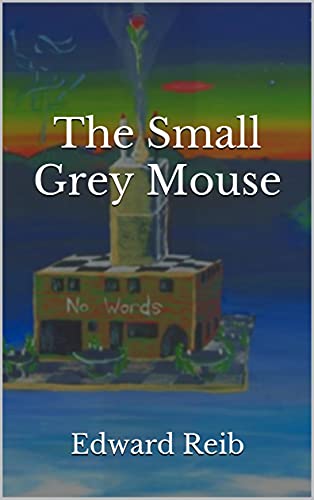 |
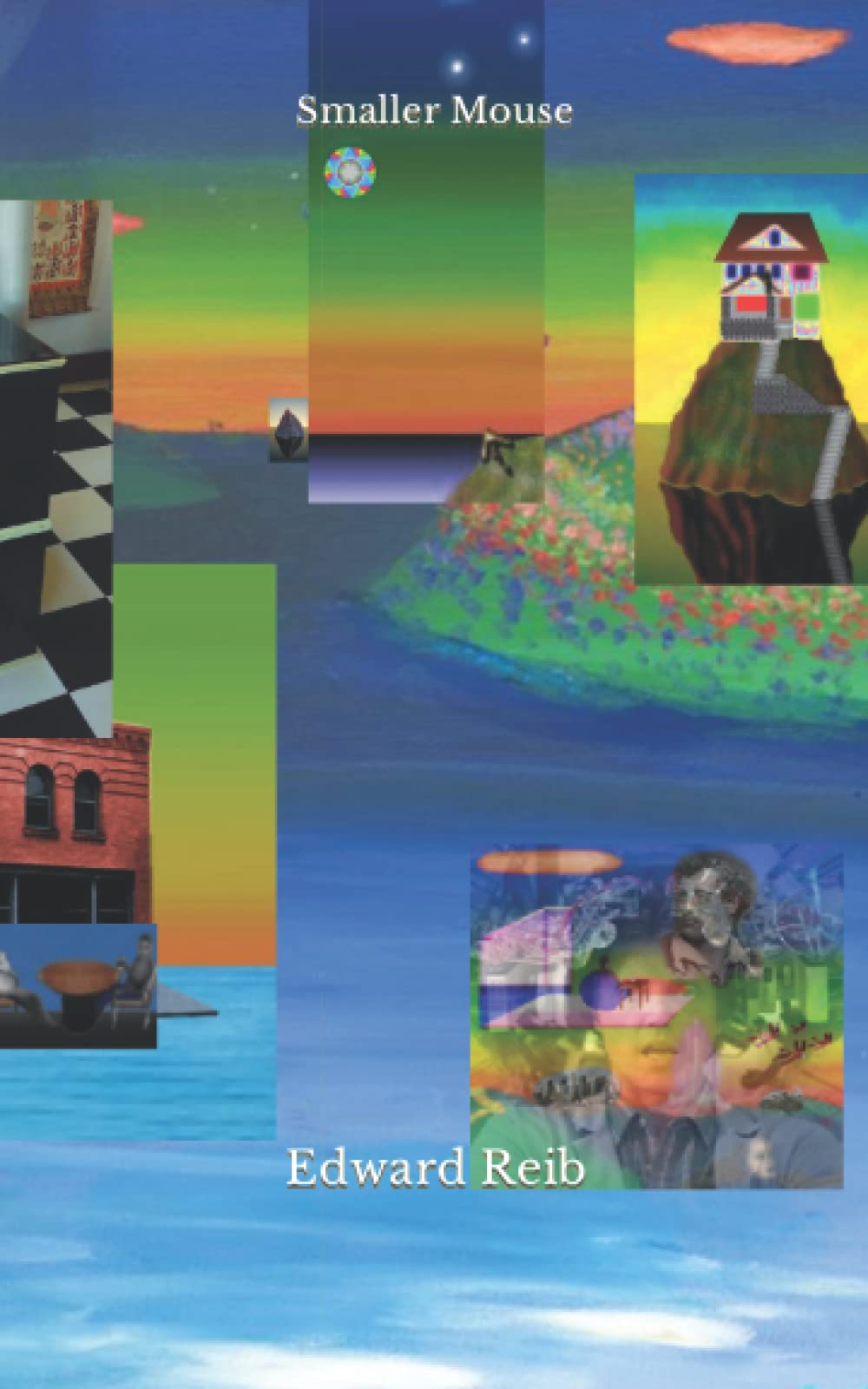 |
 |

|
 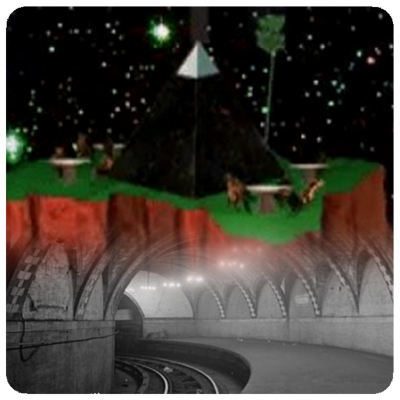 |
 |
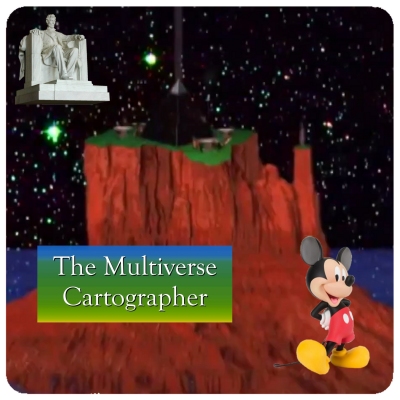  |
